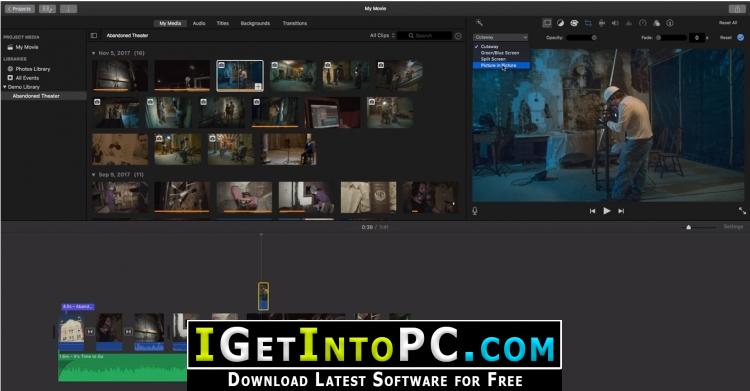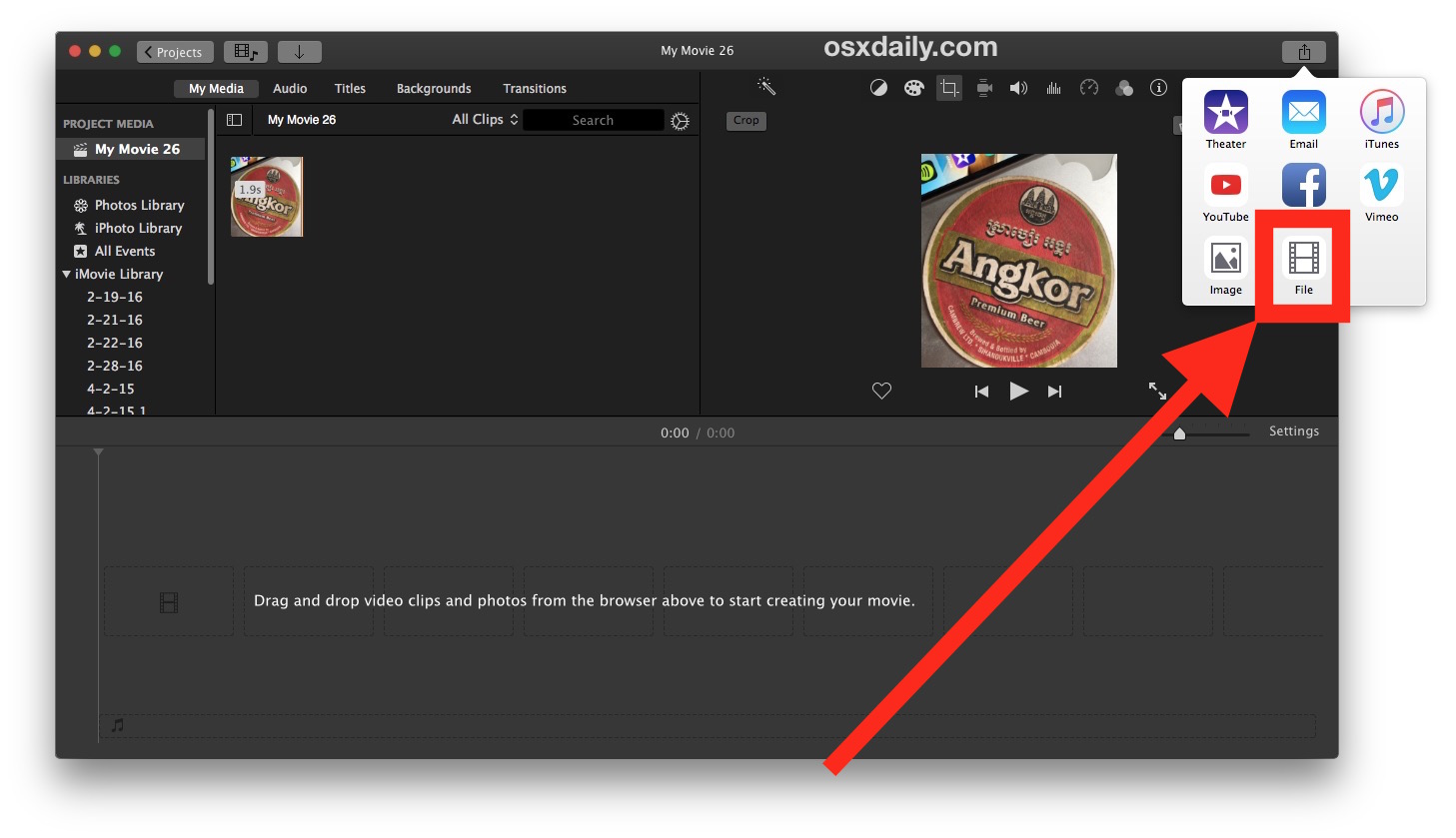

In order to edit DVD in iMovie on Mac OS X 10.11 El Capitan, you only need to rip and convert DVD movies to iMovie compatible videos on your Mac computer. Here is the step-by-step guide on how to rip and convert DVD to iMovie videos on Mac OS X with iFastime Video Converter Ultimate for Mac. Two weeks ago, Apple released iMovie 10.1.7, which suddenly requires macOS 10.12.2 (previously it only required 10.11.2). Unfortunately, my Mac, while perfectly capable of doing everything else I want, is stuck on 10.11, and now I want to use iMovie. El Capitan - 10.11. IMovie in El Capitan in VMware? Is there a way to get iMovie to work in VMware on PC? Save hide report.

If you looking on the internet a Mac OS X El Capitan 10.11.1 DMG Without app store So, you come to the right place now a day hares with you an El Capitan download dmg file OS upgrade is highly recommended is the latest release from OS X. it has been designed to improve the performance and usability of OS X Apple Inc. Today am very excited to share how to free download a full version without an app store all detail and features to describe below step by step follow the instruction.
Earlier this week I was very excited to release OS X El Capitan. The OS upgrade is highly recommended as it significantly increases Macs ‘ performance (which can run Yosemite). However, I did not have a pleasant experience in the upgrade process. I have been able to upgrade my Mac only a few hours ago. This was six times in a row after the MAS download and I wasted 15 GB data on a one-time 6.08 GB download.
Mac OS X El Capitan 10.11.6 Overview
There are many reasons for this radical decision. You decided to download an older version of Mac OS X. Initially, some applications might not (or just crash) work properly on newer operating systems. You might also have realized that the performance of your Mac fell immediately after the last update. Last but not least, if you want to run a parallel version of Mac OS X on a virtual machine, it will take you to install the file of an older Mac OS X in a functional manner.
The 2015 release Mac OS X El Capitan 10.11.6 aims primarily at providing greater safety, efficiency, and reliability. This Mac OS X release is a full package for stability, privacy, performance and file search simultaneously. Many technological improvements along with improved tweaks are made and the desktop is more smartly organized. This is a very well equipped release with many attractive characteristics such as the split view for the screens to be divided as needed. Mac OS X El Captian 10.11.6 is designed to make many bugs fixes possible in addition to dependency and security.
There are a lot of improvements to OS X El Capitan 10.11.1, such as improved installer reliability when upgrading to OS X El Capitan. Microsoft Office 2016 compatibility was also significantly improved. The update also solved an issue that prevented messages and mailboxes from being displayed in the mail. The reliability of VoiceOver has also been greatly improved. With full Unicode 7.0 and 8.0 support, over 150 emoji characters were added. The problem has also been resolved that prevented the proper operation of Audio Unit plugins. Was there a problem with JPEG images in the previous version that appears in the preview in grey and green? And in this update, this problem was fixed. you can also check out the Logic Pro X Free.
Features Of Mac OS X El Capitan 10.11.6 DMG
- Great emphasis on security and reliability.
- Designed to improve the performance and usability of OS X.
- Enhanced installer reliability when upgraded to OS X El Capitan.
- Improved compatibility with MS Office 2016.
- Enhanced VoiceOver reliability.
- More than 150 emoji characters added.
- Issue related to JPEG preview resolved.
- More improved performance and usability
- Enhanced security features
- Split screen features
- Cursor locator
- Improved search with Spotlight
- Gesture improvements
- Office 2016 with improved features with more than 150 emojis
- Advanced preview features
- Improved safari features
- VoiceOver features
- Improved installer
- Better mailing features
- Faster app switching
- Much More………………/
Mac OS X El Capitan 10.11.1 InstallESD DMG Technical Setup Details

- Software Full Name: Mac OS X El Capitan 10.11.1 InstallESD DMG
- Setup File Name: Install_OS_X_El_Capitan.app.dmg
- Full Setup Size: 5.7 GB
- Setup Type: Offline Installer / Full Standalone Setup
- Compatibility Architecture: 32 Bit (x86) / 64 Bit (x64)
- Latest Version Release Added On: 30th Oct 2015
- Developers: Mac OS X El Capitan Homepage
System Requirements For Mac OS X El Capitan 10.11.1 InstallESD DMG
Before you start Mac OS X El Capitan 10.11.1 InstallESD DMG free download, make sure your PC meets minimum system requirements.
- Memory (RAM): 2GB of RAM required.
- Hard Disk Space: 9GB of free space required.
- Processor: Intel Pentium 4 or later.
Mac OS El Capitan 10.11.1 DMG Free Download
You probably noticed that after you upgraded to OS X El Capitan, slow Mac started to become a trouble. Why does this happen? Well, we found out that El Capitan needs a lot more disk space and RAM to run quickly. The good news is, it's not just possible to speed up El Capitan — it's pretty simple.
Imovie For El Capitan 10.11.6
The easiest way to get a faster Mac with El Capitan is to get a Mac cleaner. You can download CleanMyMac X for free and simply let the app do everything for you. Speeding up El Capitan with it will only take a few minutes. But if you want to do it manually, read on.
Go over each step to speed up El Capitan system.
1.Speed up your Mac's startup
It starts at the very beginning. When you turn your Mac on, it typically launches a dozen apps at once. And you probably don't need most of them at that moment. This could be one of the reasons El Capitan running slow. To stop them from launching on startup, go to System Preferences, choose Users & Groups and then click your username. Check the unnecessary apps and click.
Don't worry, if you accidentally remove something useful, just add it back by clicking and choosing it from the Applications folder.
2.Major hard drive cleaning
One of the reasons a Mac gets slow is a full hard drive. To find out how cluttered yours is, click on the main Apple menu in the top left corner and choose About This Mac > Storage. If you see the top bar getting full, like in the screenshot below, it's time to clean up some space.
It might take a while, so here's a piece of advice on how to approach it.
- Arrange your files and folders by size to find the biggest.
To do it: open Finder, click on All My Files in the left menu bar (if you don't see it there, press Command+Shift+F (?+?+F), and then click View in the top menu bar and select Show View Options. Now choose Sort by Size and Arrange by Size. Now all your files are arranged from the biggest to the smallest. - Arrange your files and folders by date.
If you'd like to arrange them by date to find files you haven't opened in a while (maybe you forgot they were even there!), you can do this by following the steps above, and then changing arrange by Size, to arrange by Date Last Opened. Now click on Date Last Opened in the name of the column and you get a list starting with the oldest files you have.
Don't forget to look at the file type distribution in the Storage tab. It might give you a hint on the folders that occupy the most space and need cleaning.
This process takes a while because your Mac can't arrange files by both size and date at once. However, there are apps that can, such as CleanMyMac X . It has a special module that looks exactly for large and old files and sorts them for you. You can delete the files you don't need directly from the app in just a few clicks.
3. Trim down your system
Trimming down your system includes cleaning cache and temporary files, and flushing DNS.
Cleaning cache files on El Capitan
- Open a Finder window and select “Go to Folder” in the Go menu, at the top of the screen.
- Type in ~/Library/Caches and hit “enter” to proceed to this folder. Important: remove the insides of these folders, but not the folders themselves.
- Repeat 1 and 2, but replace ~/Library/Caches with /Library/Caches (simply lose the ~ symbol).
- Restart your Mac. Yes, it's kind of a pain.
It's also much easier (and faster) with an app, you can take a look at how to clean caches on Mac OS X.
Flush DNS cache on OS X 10.11
When you flush the DNS cache, what you're doing is removing old cache entries that translate internet domain names (example.com) into IP addresses. You're going to need the Terminal for this. To open Terminal, open Spotlight and type in Terminal, or find it by clicking on the Applications folder and then clicking on Utilities.

Once launched, type in:
sudo dscacheutil -flushcache;sudo killall -HUP mDNSResponder;say cache flushed
You'll need to enter the admin password to execute the command.
4. Free up memory
Usually Macs are pretty handy with memory management, but sometimes you just have to give them a direction. Check out your memory usage in the Activity Monitor (find it with Spotlight) by clicking on the Memory tab.
If Physical Memory and Memory Used have nearly equal values, it means your Mac will start using Virtual Memory soon. Virtual Memory relies on your Mac's hard drive and is so slow that you don't want to get it involved. When you start running out of memory, just clean it manually with Terminal.
Update To El Capitan
Open it as explained in the Step 3. Then, once opened, type in:
sudo purge
Os X El Capitan 10.12
Give your system a moment to process the command.
If you don't want to use the Activity Monitor or Terminal commands each time you need to free up some RAM, you can download CleanMyMac X and do it with just one click instead. After downloading CleanMyMac X, freeing up memory is… Well, free.
Imovie For El Capitan 10.11.6
5. Use CleanMyMac X
You can go over each step to speed up El Capitan, or you can keep it fast with CleanMyMac X.
It will save you hours wasted on painfully boring tasks of searching and deleting useless files. With CleanMyMac X, you can clean your hard drive and system, run maintenance scripts, clear caches and histories, uninstall apps, and remove unused extensions — all from one place.